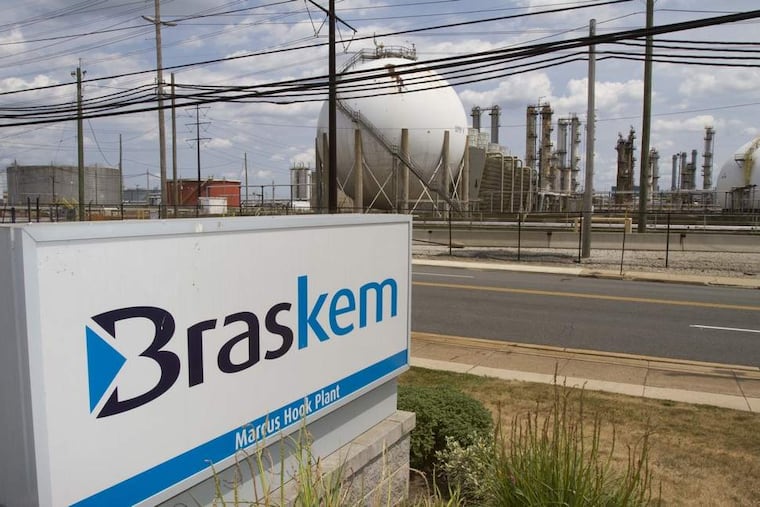They lived in a Delco factory for 28 days to make millions of pounds of raw PPE materials to help fight coronavirus
The undertaking was just one example of the endless ways that Americans in every industry have uniquely contributed to fighting the coronavirus.

At his factory just off the Delaware River, Joe Boyce clocked in on March 23 for the longest shift of his life.
In his office, an air mattress replaced his desk chair. He brought a toothbrush and shaving kit, moving into the Braskem petrochemical plant in Marcus Hook, Delaware County, as if it were a makeshift college dormitory. The casual office kitchen became a mess hall for him and his 42 coworkers-turned-roommates. The factory’s emergency operations center became their new lounge room.
For 28 days, they did not leave — sleeping and working all in one place.
In what they called a "live-in" at the factory, the undertaking was just one example of the endless ways that Americans in every industry have uniquely contributed to fighting coronavirus. The 43 men went home Sunday after each working 12-hour shifts all day and night for a month straight, producing tens of millions of pounds of the raw materials that will end up in face masks and surgical gowns worn on the front lines of the pandemic.
No one told them they had to do it, Braskem America CEO Mark Nikolich said. All of the workers volunteered, hunkering down at the plant to ensure no one caught the virus outside as they sought to meet the rocketing demand for their key product, polypropylene, which is needed to make various medical and hygienic items. Braskem’s plant in Neal, West Virginia, is doing a second live-in now.
“We were just happy to be able to help,” Boyce, an operations shift supervisor and a 27-year veteran at Braskem America, said. “We’ve been getting messages on social media from nurses, doctors, EMS workers, saying thank you for what we’re doing. But we want to thank them for what they did and are continuing to do. That’s what made the time we were in there go by quickly, just being able to support them.”
For countless face masks in America, their journey from a blob of chemicals into the hands of first responders and grocery-store clerks likely began at a plant just like Braskem's. The company, which touts itself as the largest petrochemical producer in the Americas, is one of the earliest links in the supply chain, providing a key ingredient for the personal protective equipment that millions of people worldwide now need each day.
Nikolich said the company has shifted its production lines to focus on making that key ingredient, polypropylene, given the high demand due to COVID-19. The company then sells the product to clients that turn it into a nonwoven fabric, which medical manufacturers ultimately use to make face masks, medical gowns and even disinfectant wipes, among other items.
Nikolich estimated that the Braskem plants in Pennsylvania and West Virginia have produced 40 million pounds of polypropylene over the past month — enough to hypothetically make either 500 million N95 masks or 1.5 billion surgical masks, if the material were only used for that purpose. (It will also be used for other PPE such as the gowns, Nikolich stressed.)
"It just makes you immensely proud to be associated with a team like that," Nikolich said. "They're operating in a strange environment 24/7, 365."
Nikolich said the plants decided to launch the live-ins so employees could avoid having to worry about catching the virus while constantly traveling to and from work, and so the staff at the factory could be closed off to nonessential personnel.
"We tried to make them as comfortable as possible," Nikolich said.
Boyce said some guys brought their Xbox consoles and TVs, and even a cornhole set, to stay entertained. They stayed active at the on-site gym, which "has never been used so much before," Boyce said, and stayed extra busy in the kitchen. A skilled cook, Boyce and others asked corporate for more pots and pans and a stove, whipping up creamed corn, barbecue and even filet mignon dinners for more than 40 people a night.
Before long, they fell into a routine like they were all in one enormous household, he said.
"We had to kind of adapt. We came up with a chart for housekeeping chores so we could all clean the bathrooms and clean up after meals," Boyce said. "It wasn't long before we're all sitting in the same spots at dinner."
But being separated from family got harder as time went on, said Boyce, a father of two teenagers. Some guys counted down the days. One missed the birth of his first grandchild. Visitors weren't allowed.
So on Day 14, the families organized a "drive-by visit," Boyce said. It was their hump day, celebrating not only being halfway done but also free of any signs of the virus, as no one during that 14-day period developed even a sniffle. With a police escort, more than two dozen families paraded past the plant bearing signs and cheering from the windows — too far away for a conversation but just close enough "to give a boost to all the guys," Boyce said.
"It was something to see," he said. "Just a shout and wave was pretty much what we got, but it was enough."
They went back to work. The days blended between factory floor and conference-room bedrooms, until finally, on Sunday, it was time to clock out.
“We wanted to walk out as a team,” Boyce said. “Everybody felt that way. It really hit me when my car got a little ways down from the plant — I’m finally going to see my family.”